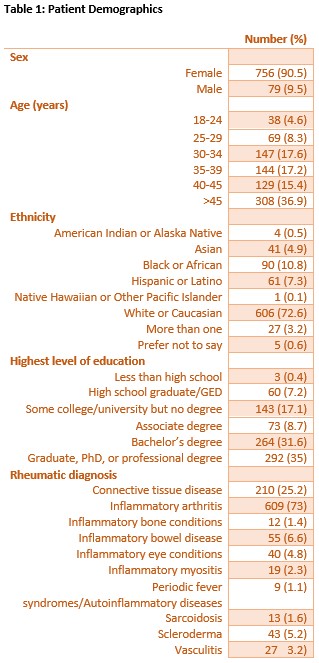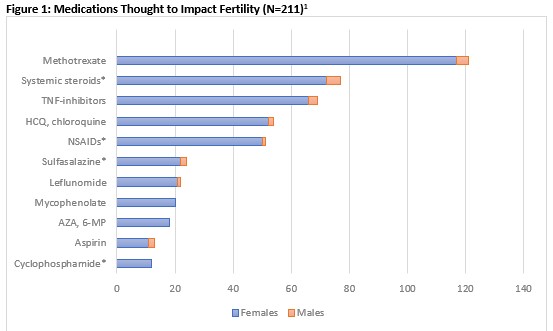Back
Poster Session B
Reproductive health
Session: (0939–0969) Reproductive Issues in Rheumatic Disorders Poster
0948: Fertility and the Use of Assisted Reproductive Technologies: Perceptions, Thoughts and Experiences of Men and Women with Rheumatic Disease
Sunday, November 13, 2022
9:00 AM – 10:30 AM Eastern Time
Location: Virtual Poster Hall
- ML
Molly Leavitt, MD, MBA
University of Chicago
Chicago, IL, United States
Abstract Poster Presenter(s)
Emily Peninger1, Molly Leavitt1, Cuoghi Edens1 and Shilpa Venkatachalam2, 1University of Chicago, Chicago, IL, 2Global Healthy Living Foundation, New York, NY
Background/Purpose: Patients with rheumatic diseases have fewer biologic children than those without for a number of reasons, including infertility. Patients with rheumatic diseases may therefore be notable candidates for evaluation by fertility specialists and utilization of assisted reproductive technologies (ART) as suggested in the 2020 ACR Reproductive Health Guidelines.
We sought to identify men and women across rheumatic diseases, characterize their perception of the impact their rheumatic disease and associated therapies have on childbearing, determine their knowledge and utilization of ART, and isolate potential barriers to the use of ART in hopes of improving patient and clinician education and increasing infertility awareness and utilization of ART in those with rheumatic disease.
Methods: Subjects were recruited to complete an anonymous electronic survey via rheumatic disease-specific social media pages, our institution's rheumatology clinic, the Arthritis Foundation®, and CreakyJoints®. Those who had not been evaluated by a rheumatologist or other subspecialist for their rheumatic diagnosis within the last one year were excluded. Demographics and details of their rheumatic diagnosis and utilized therapies were collected. We gauged patients' perception of how their rheumatic disease and its therapies could or has impacted their ability to have biological children, as well as their understanding of the safety and efficacy of ART in rheumatic diseases. Descriptive statistics were used to summarize responses.
Results: We recruited 835 patients including 756 females (90%) and 79 males (10%) of varying ages. 606 identified as White or Caucasian (73%). Inflammatory arthritis was the most common diagnosis, followed by connective tissue diseases and inflammatory bowel disease (Table 1).
Overall, more than 60% of participants believed that their rheumatic disease had or may have affected their fertility. 25% reported belief that the medications used to treat their rheumatic disease can or has affected their fertility with the most cited being methotrexate, corticosteroids, TNF-inhibitors, hydroxychloroquine, and NSAIDs (Figure 1).
92% had heard of ART, but many reported being unsure if these are safe (60%) or successful (42%) in patients with rheumatic diseases. Of patients reporting a history of infertility (29%), only 52% reported utilizing ART (Figure 2) citing cost/lack of insurance coverage, ultimate ability to conceive, decision not to pursue pregnancy, and uncontrolled rheumatic/autoimmune disease as the most common reasons.
Subjects overwhelmingly wanted their rheumatologists to be the source of knowledge regarding the effects of their diagnosis and treatment on fertility.
Conclusion: There are ongoing misconceptions regarding how rheumatic diagnoses and therapies affect fertility in both males and females. Further, ART is underutilized by infertile patients with rheumatic disease with safety as a concern though other barriers were identified. This warrants special attention by rheumatologists and other reproductive care clinicians to ensure these educational gaps are addressed and patients are referred to fertility specialists.
 Connective tissue disease – systemic lupus erythematosus (SLE), mixed connective tissue disease (MCTD), undifferentiated connective tissue disease (UCTD); Inflammatory arthritis – juvenile idiopathic arthritis (JIA), rheumatoid arthritis (RA), seronegative RA, ankylosing spondylitis (AS), psoriatic arthritis (PsA), seronegative spondyloarthropathy (SpA), sacroiliitis, non-radiographic axial SpA; Inflammatory bone conditions – chronic recurrent multifocal osteomyelitis, SAPHO syndrome; Inflammatory bowel disease (IBD) - Crohn's, microscopic colitis, ulcerative colitis; Inflammatory eye conditions - uveitis, iritis; Periodic fever syndromes/Autoinflammatory diseases - for example but not limited to familial Mediterranean fever (FMF), tumor necrosis factor receptor associated periodic syndrome (TRAPS), Muckle-Wells Syndrome (MWS), hyperimmunoglobulin D syndrome (HIDS), adult-onset Still's disease (AOSD); Vasculitis - giant cell arteritis (GCA), Takayasu's arteritis, granulomatosis with polyangiitis (GPA), microscopic polyangiitis (MPA), Behcet's disease, polyarteritis nodosa (PAN), eosinophilic granulomatosis with polyangiitis (EGPA), cryoglobulinemic vasculitis, IgA vasculitis, leukocytoclastic vasculitis (LCV)
Connective tissue disease – systemic lupus erythematosus (SLE), mixed connective tissue disease (MCTD), undifferentiated connective tissue disease (UCTD); Inflammatory arthritis – juvenile idiopathic arthritis (JIA), rheumatoid arthritis (RA), seronegative RA, ankylosing spondylitis (AS), psoriatic arthritis (PsA), seronegative spondyloarthropathy (SpA), sacroiliitis, non-radiographic axial SpA; Inflammatory bone conditions – chronic recurrent multifocal osteomyelitis, SAPHO syndrome; Inflammatory bowel disease (IBD) - Crohn's, microscopic colitis, ulcerative colitis; Inflammatory eye conditions - uveitis, iritis; Periodic fever syndromes/Autoinflammatory diseases - for example but not limited to familial Mediterranean fever (FMF), tumor necrosis factor receptor associated periodic syndrome (TRAPS), Muckle-Wells Syndrome (MWS), hyperimmunoglobulin D syndrome (HIDS), adult-onset Still's disease (AOSD); Vasculitis - giant cell arteritis (GCA), Takayasu's arteritis, granulomatosis with polyangiitis (GPA), microscopic polyangiitis (MPA), Behcet's disease, polyarteritis nodosa (PAN), eosinophilic granulomatosis with polyangiitis (EGPA), cryoglobulinemic vasculitis, IgA vasculitis, leukocytoclastic vasculitis (LCV)
 HCQ: hydroxychloroquine; NSAIDs: non-steroidal anti-inflammatory drugs; AZA: azathioprine; 6-MP: 6-mercaptopurine
HCQ: hydroxychloroquine; NSAIDs: non-steroidal anti-inflammatory drugs; AZA: azathioprine; 6-MP: 6-mercaptopurine
1 Of patients who reported belief that the medications taken for their rheumatic disease can or has affected their fertility
*Medications with evidence to support effect on fertility
.jpg) 1 Of patients who reported a history of infertility but had not pursued ART
1 Of patients who reported a history of infertility but had not pursued ART
Disclosures: E. Peninger, None; M. Leavitt, None; C. Edens, None; S. Venkatachalam, None.
Background/Purpose: Patients with rheumatic diseases have fewer biologic children than those without for a number of reasons, including infertility. Patients with rheumatic diseases may therefore be notable candidates for evaluation by fertility specialists and utilization of assisted reproductive technologies (ART) as suggested in the 2020 ACR Reproductive Health Guidelines.
We sought to identify men and women across rheumatic diseases, characterize their perception of the impact their rheumatic disease and associated therapies have on childbearing, determine their knowledge and utilization of ART, and isolate potential barriers to the use of ART in hopes of improving patient and clinician education and increasing infertility awareness and utilization of ART in those with rheumatic disease.
Methods: Subjects were recruited to complete an anonymous electronic survey via rheumatic disease-specific social media pages, our institution's rheumatology clinic, the Arthritis Foundation®, and CreakyJoints®. Those who had not been evaluated by a rheumatologist or other subspecialist for their rheumatic diagnosis within the last one year were excluded. Demographics and details of their rheumatic diagnosis and utilized therapies were collected. We gauged patients' perception of how their rheumatic disease and its therapies could or has impacted their ability to have biological children, as well as their understanding of the safety and efficacy of ART in rheumatic diseases. Descriptive statistics were used to summarize responses.
Results: We recruited 835 patients including 756 females (90%) and 79 males (10%) of varying ages. 606 identified as White or Caucasian (73%). Inflammatory arthritis was the most common diagnosis, followed by connective tissue diseases and inflammatory bowel disease (Table 1).
Overall, more than 60% of participants believed that their rheumatic disease had or may have affected their fertility. 25% reported belief that the medications used to treat their rheumatic disease can or has affected their fertility with the most cited being methotrexate, corticosteroids, TNF-inhibitors, hydroxychloroquine, and NSAIDs (Figure 1).
92% had heard of ART, but many reported being unsure if these are safe (60%) or successful (42%) in patients with rheumatic diseases. Of patients reporting a history of infertility (29%), only 52% reported utilizing ART (Figure 2) citing cost/lack of insurance coverage, ultimate ability to conceive, decision not to pursue pregnancy, and uncontrolled rheumatic/autoimmune disease as the most common reasons.
Subjects overwhelmingly wanted their rheumatologists to be the source of knowledge regarding the effects of their diagnosis and treatment on fertility.
Conclusion: There are ongoing misconceptions regarding how rheumatic diagnoses and therapies affect fertility in both males and females. Further, ART is underutilized by infertile patients with rheumatic disease with safety as a concern though other barriers were identified. This warrants special attention by rheumatologists and other reproductive care clinicians to ensure these educational gaps are addressed and patients are referred to fertility specialists.
 Connective tissue disease – systemic lupus erythematosus (SLE), mixed connective tissue disease (MCTD), undifferentiated connective tissue disease (UCTD); Inflammatory arthritis – juvenile idiopathic arthritis (JIA), rheumatoid arthritis (RA), seronegative RA, ankylosing spondylitis (AS), psoriatic arthritis (PsA), seronegative spondyloarthropathy (SpA), sacroiliitis, non-radiographic axial SpA; Inflammatory bone conditions – chronic recurrent multifocal osteomyelitis, SAPHO syndrome; Inflammatory bowel disease (IBD) - Crohn's, microscopic colitis, ulcerative colitis; Inflammatory eye conditions - uveitis, iritis; Periodic fever syndromes/Autoinflammatory diseases - for example but not limited to familial Mediterranean fever (FMF), tumor necrosis factor receptor associated periodic syndrome (TRAPS), Muckle-Wells Syndrome (MWS), hyperimmunoglobulin D syndrome (HIDS), adult-onset Still's disease (AOSD); Vasculitis - giant cell arteritis (GCA), Takayasu's arteritis, granulomatosis with polyangiitis (GPA), microscopic polyangiitis (MPA), Behcet's disease, polyarteritis nodosa (PAN), eosinophilic granulomatosis with polyangiitis (EGPA), cryoglobulinemic vasculitis, IgA vasculitis, leukocytoclastic vasculitis (LCV)
Connective tissue disease – systemic lupus erythematosus (SLE), mixed connective tissue disease (MCTD), undifferentiated connective tissue disease (UCTD); Inflammatory arthritis – juvenile idiopathic arthritis (JIA), rheumatoid arthritis (RA), seronegative RA, ankylosing spondylitis (AS), psoriatic arthritis (PsA), seronegative spondyloarthropathy (SpA), sacroiliitis, non-radiographic axial SpA; Inflammatory bone conditions – chronic recurrent multifocal osteomyelitis, SAPHO syndrome; Inflammatory bowel disease (IBD) - Crohn's, microscopic colitis, ulcerative colitis; Inflammatory eye conditions - uveitis, iritis; Periodic fever syndromes/Autoinflammatory diseases - for example but not limited to familial Mediterranean fever (FMF), tumor necrosis factor receptor associated periodic syndrome (TRAPS), Muckle-Wells Syndrome (MWS), hyperimmunoglobulin D syndrome (HIDS), adult-onset Still's disease (AOSD); Vasculitis - giant cell arteritis (GCA), Takayasu's arteritis, granulomatosis with polyangiitis (GPA), microscopic polyangiitis (MPA), Behcet's disease, polyarteritis nodosa (PAN), eosinophilic granulomatosis with polyangiitis (EGPA), cryoglobulinemic vasculitis, IgA vasculitis, leukocytoclastic vasculitis (LCV) HCQ: hydroxychloroquine; NSAIDs: non-steroidal anti-inflammatory drugs; AZA: azathioprine; 6-MP: 6-mercaptopurine
HCQ: hydroxychloroquine; NSAIDs: non-steroidal anti-inflammatory drugs; AZA: azathioprine; 6-MP: 6-mercaptopurine1 Of patients who reported belief that the medications taken for their rheumatic disease can or has affected their fertility
*Medications with evidence to support effect on fertility
.jpg) 1 Of patients who reported a history of infertility but had not pursued ART
1 Of patients who reported a history of infertility but had not pursued ARTDisclosures: E. Peninger, None; M. Leavitt, None; C. Edens, None; S. Venkatachalam, None.

